Financial Management Report: Agency Theory and Macroeconomic Policies
VerifiedAdded on 2020/10/22
|6
|1492
|125
Report
AI Summary
This report delves into the core principles of financial management, emphasizing its crucial role within organizations. It examines the significance of stakeholder objectives and the implications of agency theory, detailing how management can align financial decisions with stakeholder interests. The report further analyzes the effects of monetary, exchange rate, fiscal, and interest rate policies on achieving macroeconomic targets, providing a comprehensive overview of how these instruments are utilized to influence economic growth, stability, and other key objectives. The report also discusses the advantages and disadvantages of agency theory and how it can be used for effective control and governance in a business entity. It concludes by highlighting the interconnectedness of financial management, agency theory, and macroeconomic policies in driving organizational success and achieving broader economic goals.
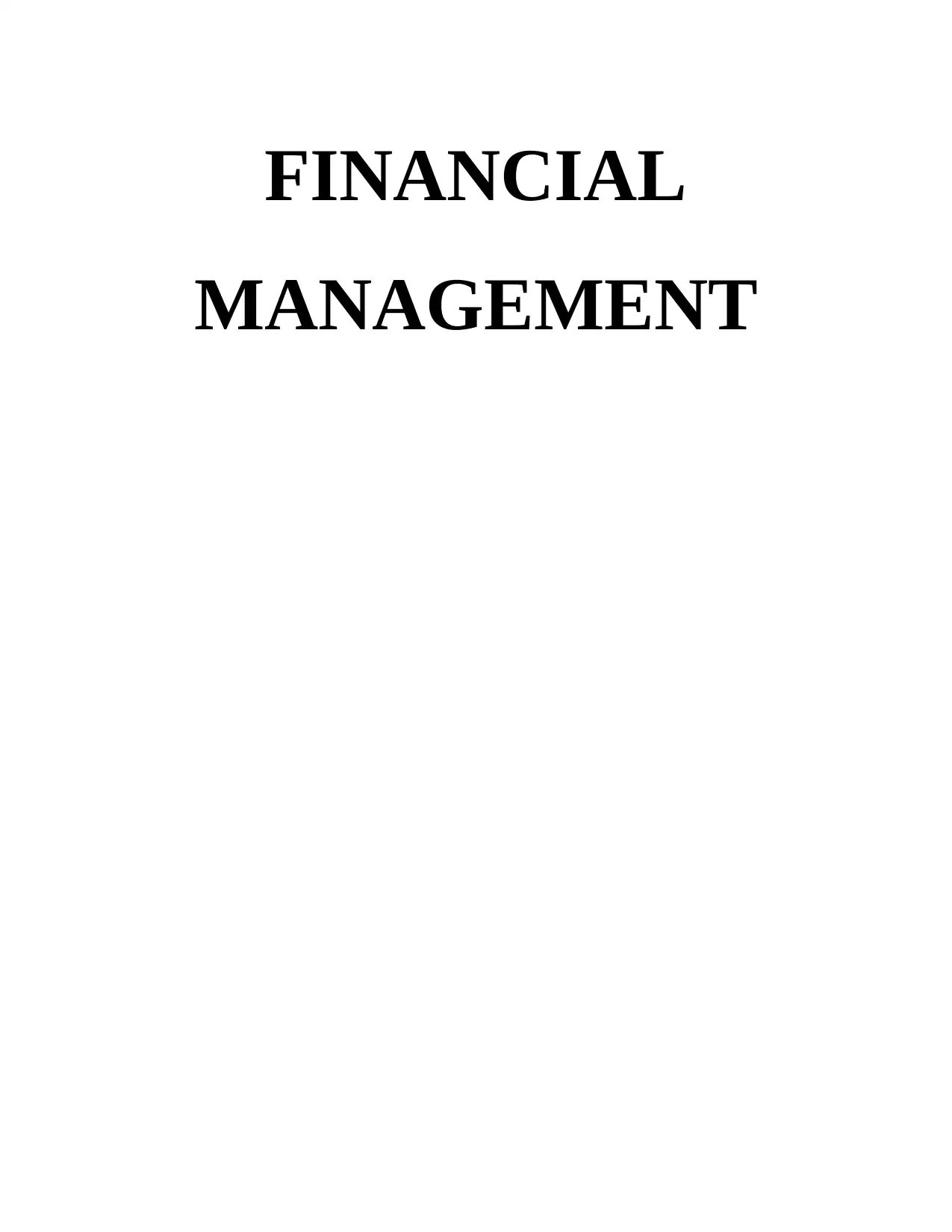
FINANCIAL
MANAGEMENT
MANAGEMENT
Paraphrase This Document
Need a fresh take? Get an instant paraphrase of this document with our AI Paraphraser
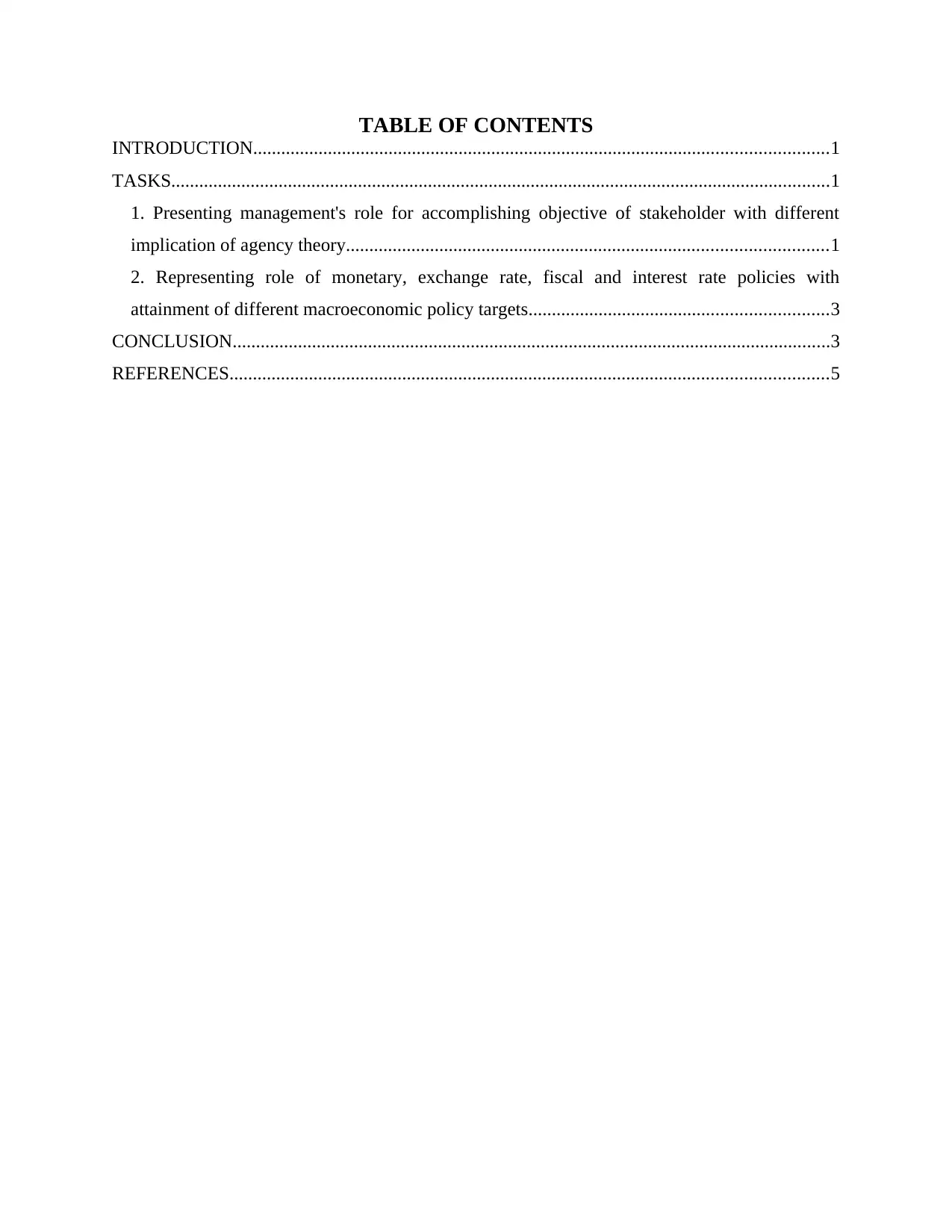
TABLE OF CONTENTS
INTRODUCTION...........................................................................................................................1
TASKS.............................................................................................................................................1
1. Presenting management's role for accomplishing objective of stakeholder with different
implication of agency theory.......................................................................................................1
2. Representing role of monetary, exchange rate, fiscal and interest rate policies with
attainment of different macroeconomic policy targets................................................................3
CONCLUSION................................................................................................................................3
REFERENCES................................................................................................................................5
INTRODUCTION...........................................................................................................................1
TASKS.............................................................................................................................................1
1. Presenting management's role for accomplishing objective of stakeholder with different
implication of agency theory.......................................................................................................1
2. Representing role of monetary, exchange rate, fiscal and interest rate policies with
attainment of different macroeconomic policy targets................................................................3
CONCLUSION................................................................................................................................3
REFERENCES................................................................................................................................5
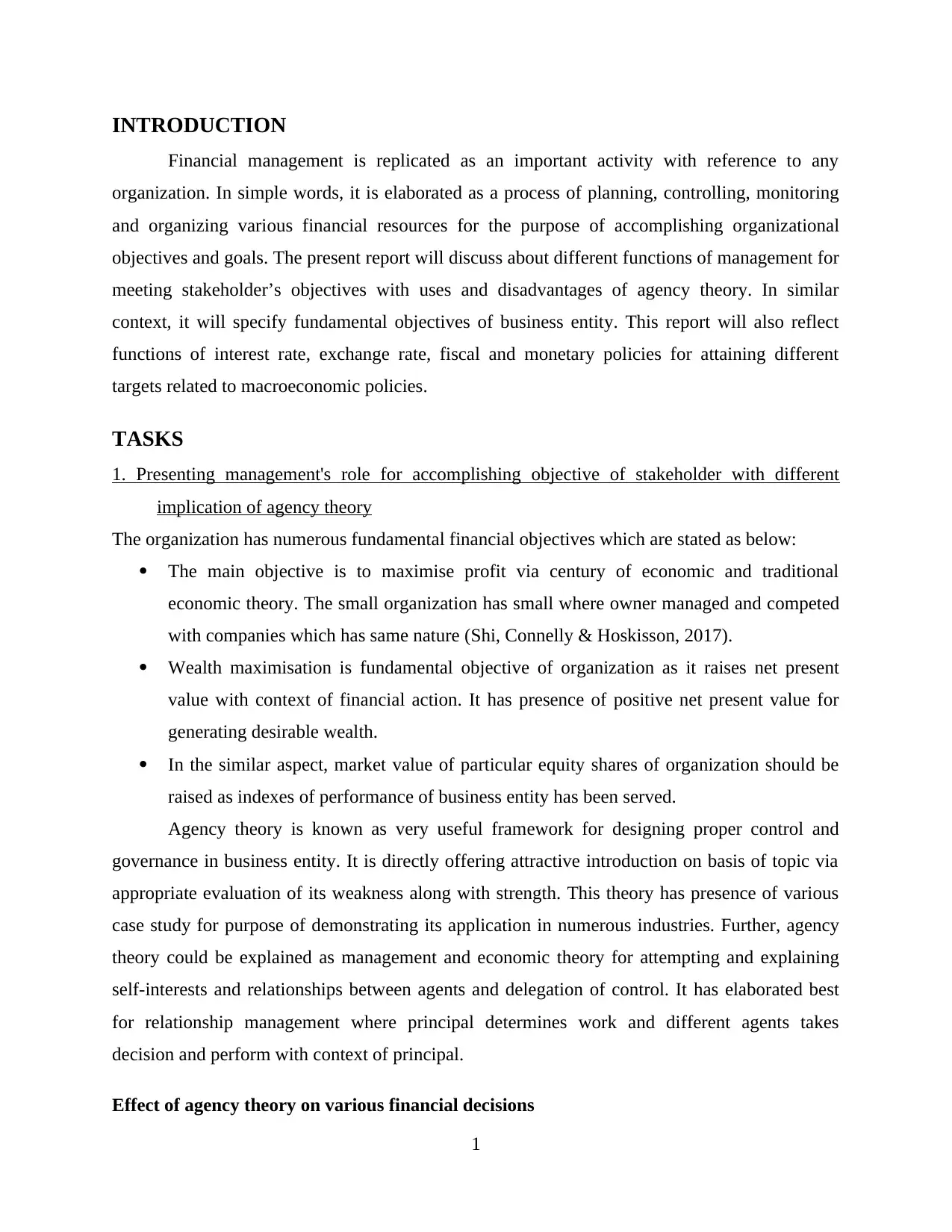
INTRODUCTION
Financial management is replicated as an important activity with reference to any
organization. In simple words, it is elaborated as a process of planning, controlling, monitoring
and organizing various financial resources for the purpose of accomplishing organizational
objectives and goals. The present report will discuss about different functions of management for
meeting stakeholder’s objectives with uses and disadvantages of agency theory. In similar
context, it will specify fundamental objectives of business entity. This report will also reflect
functions of interest rate, exchange rate, fiscal and monetary policies for attaining different
targets related to macroeconomic policies.
TASKS
1. Presenting management's role for accomplishing objective of stakeholder with different
implication of agency theory
The organization has numerous fundamental financial objectives which are stated as below:
The main objective is to maximise profit via century of economic and traditional
economic theory. The small organization has small where owner managed and competed
with companies which has same nature (Shi, Connelly & Hoskisson, 2017).
Wealth maximisation is fundamental objective of organization as it raises net present
value with context of financial action. It has presence of positive net present value for
generating desirable wealth.
In the similar aspect, market value of particular equity shares of organization should be
raised as indexes of performance of business entity has been served.
Agency theory is known as very useful framework for designing proper control and
governance in business entity. It is directly offering attractive introduction on basis of topic via
appropriate evaluation of its weakness along with strength. This theory has presence of various
case study for purpose of demonstrating its application in numerous industries. Further, agency
theory could be explained as management and economic theory for attempting and explaining
self-interests and relationships between agents and delegation of control. It has elaborated best
for relationship management where principal determines work and different agents takes
decision and perform with context of principal.
Effect of agency theory on various financial decisions
1
Financial management is replicated as an important activity with reference to any
organization. In simple words, it is elaborated as a process of planning, controlling, monitoring
and organizing various financial resources for the purpose of accomplishing organizational
objectives and goals. The present report will discuss about different functions of management for
meeting stakeholder’s objectives with uses and disadvantages of agency theory. In similar
context, it will specify fundamental objectives of business entity. This report will also reflect
functions of interest rate, exchange rate, fiscal and monetary policies for attaining different
targets related to macroeconomic policies.
TASKS
1. Presenting management's role for accomplishing objective of stakeholder with different
implication of agency theory
The organization has numerous fundamental financial objectives which are stated as below:
The main objective is to maximise profit via century of economic and traditional
economic theory. The small organization has small where owner managed and competed
with companies which has same nature (Shi, Connelly & Hoskisson, 2017).
Wealth maximisation is fundamental objective of organization as it raises net present
value with context of financial action. It has presence of positive net present value for
generating desirable wealth.
In the similar aspect, market value of particular equity shares of organization should be
raised as indexes of performance of business entity has been served.
Agency theory is known as very useful framework for designing proper control and
governance in business entity. It is directly offering attractive introduction on basis of topic via
appropriate evaluation of its weakness along with strength. This theory has presence of various
case study for purpose of demonstrating its application in numerous industries. Further, agency
theory could be explained as management and economic theory for attempting and explaining
self-interests and relationships between agents and delegation of control. It has elaborated best
for relationship management where principal determines work and different agents takes
decision and perform with context of principal.
Effect of agency theory on various financial decisions
1
⊘ This is a preview!⊘
Do you want full access?
Subscribe today to unlock all pages.

Trusted by 1+ million students worldwide
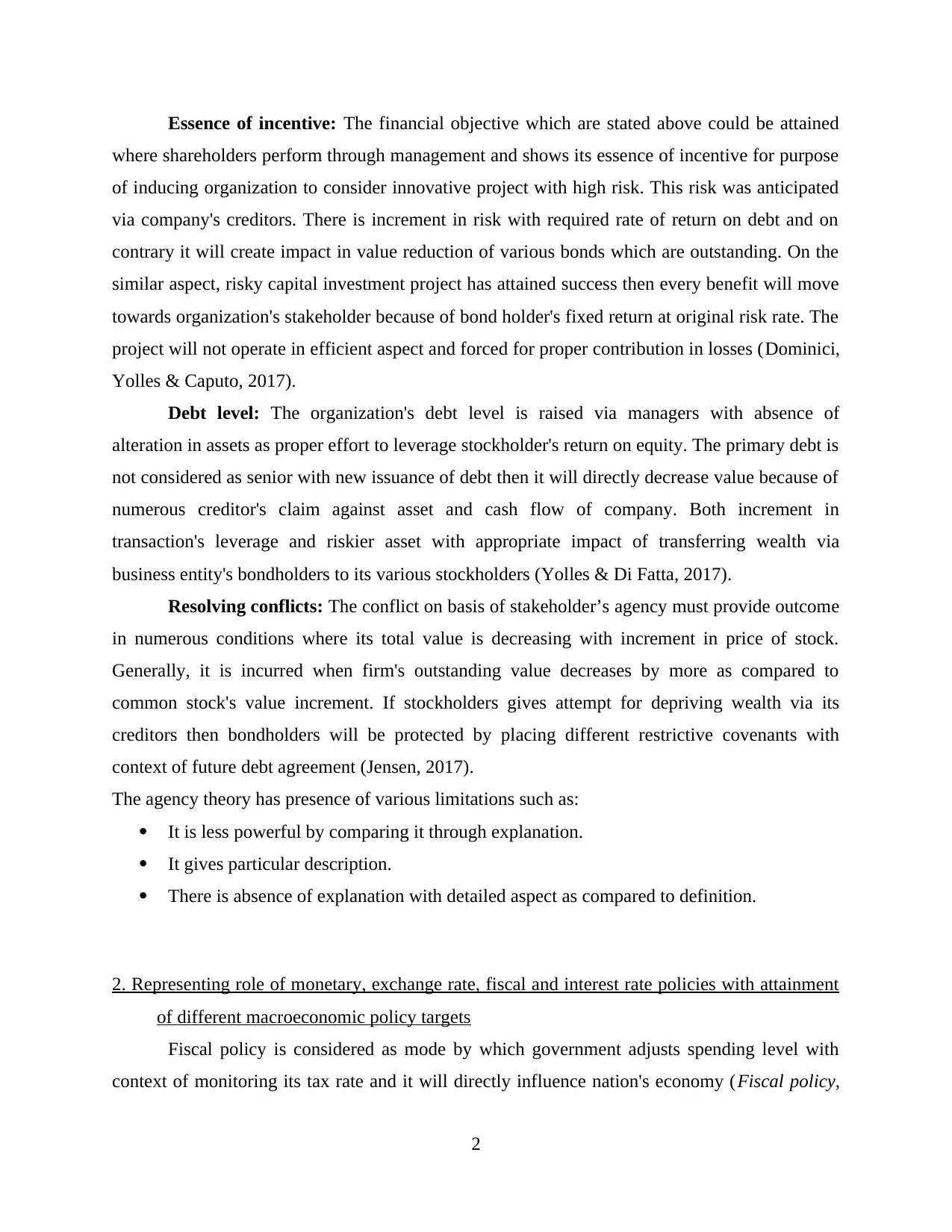
Essence of incentive: The financial objective which are stated above could be attained
where shareholders perform through management and shows its essence of incentive for purpose
of inducing organization to consider innovative project with high risk. This risk was anticipated
via company's creditors. There is increment in risk with required rate of return on debt and on
contrary it will create impact in value reduction of various bonds which are outstanding. On the
similar aspect, risky capital investment project has attained success then every benefit will move
towards organization's stakeholder because of bond holder's fixed return at original risk rate. The
project will not operate in efficient aspect and forced for proper contribution in losses (Dominici,
Yolles & Caputo, 2017).
Debt level: The organization's debt level is raised via managers with absence of
alteration in assets as proper effort to leverage stockholder's return on equity. The primary debt is
not considered as senior with new issuance of debt then it will directly decrease value because of
numerous creditor's claim against asset and cash flow of company. Both increment in
transaction's leverage and riskier asset with appropriate impact of transferring wealth via
business entity's bondholders to its various stockholders (Yolles & Di Fatta, 2017).
Resolving conflicts: The conflict on basis of stakeholder’s agency must provide outcome
in numerous conditions where its total value is decreasing with increment in price of stock.
Generally, it is incurred when firm's outstanding value decreases by more as compared to
common stock's value increment. If stockholders gives attempt for depriving wealth via its
creditors then bondholders will be protected by placing different restrictive covenants with
context of future debt agreement (Jensen, 2017).
The agency theory has presence of various limitations such as:
It is less powerful by comparing it through explanation.
It gives particular description.
There is absence of explanation with detailed aspect as compared to definition.
2. Representing role of monetary, exchange rate, fiscal and interest rate policies with attainment
of different macroeconomic policy targets
Fiscal policy is considered as mode by which government adjusts spending level with
context of monitoring its tax rate and it will directly influence nation's economy (Fiscal policy,
2
where shareholders perform through management and shows its essence of incentive for purpose
of inducing organization to consider innovative project with high risk. This risk was anticipated
via company's creditors. There is increment in risk with required rate of return on debt and on
contrary it will create impact in value reduction of various bonds which are outstanding. On the
similar aspect, risky capital investment project has attained success then every benefit will move
towards organization's stakeholder because of bond holder's fixed return at original risk rate. The
project will not operate in efficient aspect and forced for proper contribution in losses (Dominici,
Yolles & Caputo, 2017).
Debt level: The organization's debt level is raised via managers with absence of
alteration in assets as proper effort to leverage stockholder's return on equity. The primary debt is
not considered as senior with new issuance of debt then it will directly decrease value because of
numerous creditor's claim against asset and cash flow of company. Both increment in
transaction's leverage and riskier asset with appropriate impact of transferring wealth via
business entity's bondholders to its various stockholders (Yolles & Di Fatta, 2017).
Resolving conflicts: The conflict on basis of stakeholder’s agency must provide outcome
in numerous conditions where its total value is decreasing with increment in price of stock.
Generally, it is incurred when firm's outstanding value decreases by more as compared to
common stock's value increment. If stockholders gives attempt for depriving wealth via its
creditors then bondholders will be protected by placing different restrictive covenants with
context of future debt agreement (Jensen, 2017).
The agency theory has presence of various limitations such as:
It is less powerful by comparing it through explanation.
It gives particular description.
There is absence of explanation with detailed aspect as compared to definition.
2. Representing role of monetary, exchange rate, fiscal and interest rate policies with attainment
of different macroeconomic policy targets
Fiscal policy is considered as mode by which government adjusts spending level with
context of monitoring its tax rate and it will directly influence nation's economy (Fiscal policy,
2
Paraphrase This Document
Need a fresh take? Get an instant paraphrase of this document with our AI Paraphraser
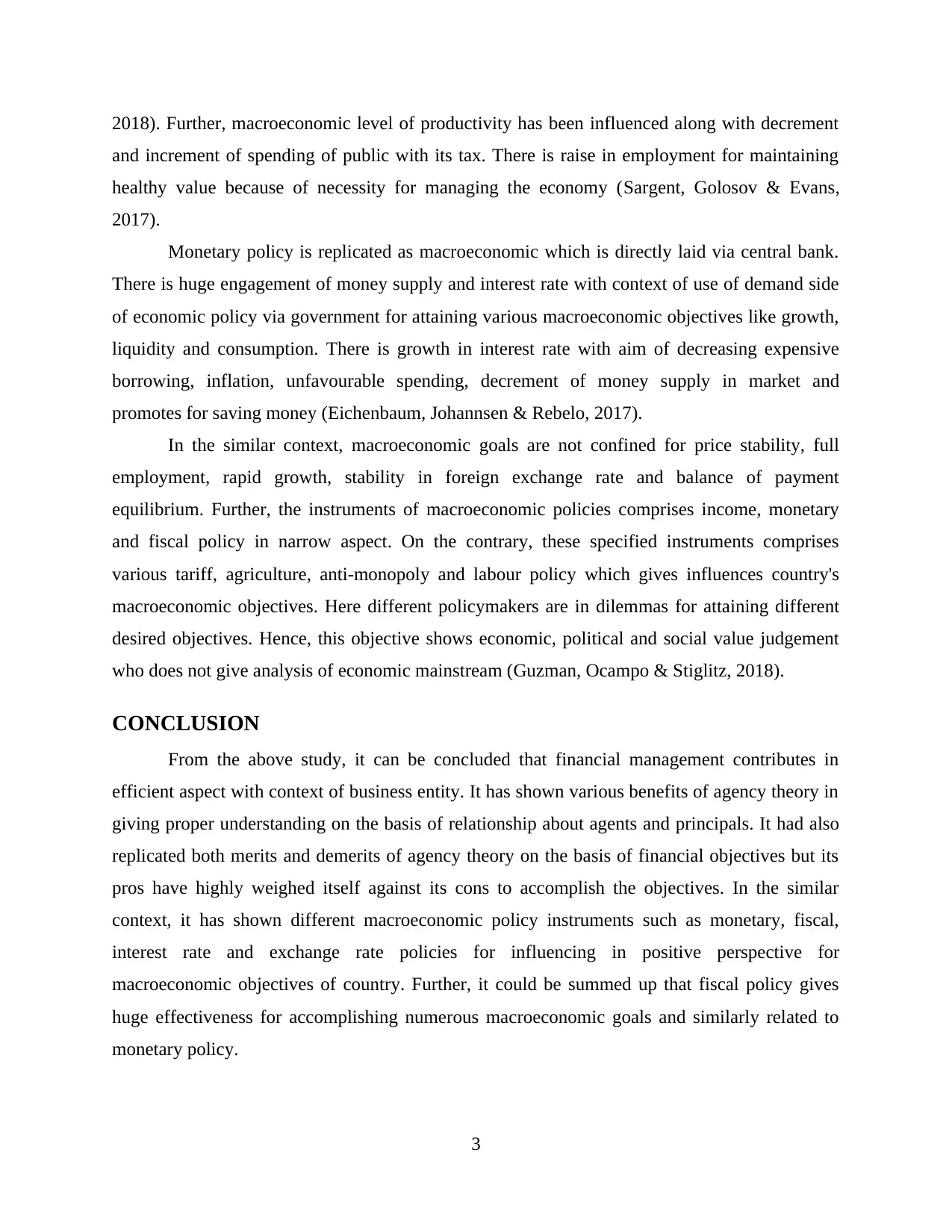
2018). Further, macroeconomic level of productivity has been influenced along with decrement
and increment of spending of public with its tax. There is raise in employment for maintaining
healthy value because of necessity for managing the economy (Sargent, Golosov & Evans,
2017).
Monetary policy is replicated as macroeconomic which is directly laid via central bank.
There is huge engagement of money supply and interest rate with context of use of demand side
of economic policy via government for attaining various macroeconomic objectives like growth,
liquidity and consumption. There is growth in interest rate with aim of decreasing expensive
borrowing, inflation, unfavourable spending, decrement of money supply in market and
promotes for saving money (Eichenbaum, Johannsen & Rebelo, 2017).
In the similar context, macroeconomic goals are not confined for price stability, full
employment, rapid growth, stability in foreign exchange rate and balance of payment
equilibrium. Further, the instruments of macroeconomic policies comprises income, monetary
and fiscal policy in narrow aspect. On the contrary, these specified instruments comprises
various tariff, agriculture, anti-monopoly and labour policy which gives influences country's
macroeconomic objectives. Here different policymakers are in dilemmas for attaining different
desired objectives. Hence, this objective shows economic, political and social value judgement
who does not give analysis of economic mainstream (Guzman, Ocampo & Stiglitz, 2018).
CONCLUSION
From the above study, it can be concluded that financial management contributes in
efficient aspect with context of business entity. It has shown various benefits of agency theory in
giving proper understanding on the basis of relationship about agents and principals. It had also
replicated both merits and demerits of agency theory on the basis of financial objectives but its
pros have highly weighed itself against its cons to accomplish the objectives. In the similar
context, it has shown different macroeconomic policy instruments such as monetary, fiscal,
interest rate and exchange rate policies for influencing in positive perspective for
macroeconomic objectives of country. Further, it could be summed up that fiscal policy gives
huge effectiveness for accomplishing numerous macroeconomic goals and similarly related to
monetary policy.
3
and increment of spending of public with its tax. There is raise in employment for maintaining
healthy value because of necessity for managing the economy (Sargent, Golosov & Evans,
2017).
Monetary policy is replicated as macroeconomic which is directly laid via central bank.
There is huge engagement of money supply and interest rate with context of use of demand side
of economic policy via government for attaining various macroeconomic objectives like growth,
liquidity and consumption. There is growth in interest rate with aim of decreasing expensive
borrowing, inflation, unfavourable spending, decrement of money supply in market and
promotes for saving money (Eichenbaum, Johannsen & Rebelo, 2017).
In the similar context, macroeconomic goals are not confined for price stability, full
employment, rapid growth, stability in foreign exchange rate and balance of payment
equilibrium. Further, the instruments of macroeconomic policies comprises income, monetary
and fiscal policy in narrow aspect. On the contrary, these specified instruments comprises
various tariff, agriculture, anti-monopoly and labour policy which gives influences country's
macroeconomic objectives. Here different policymakers are in dilemmas for attaining different
desired objectives. Hence, this objective shows economic, political and social value judgement
who does not give analysis of economic mainstream (Guzman, Ocampo & Stiglitz, 2018).
CONCLUSION
From the above study, it can be concluded that financial management contributes in
efficient aspect with context of business entity. It has shown various benefits of agency theory in
giving proper understanding on the basis of relationship about agents and principals. It had also
replicated both merits and demerits of agency theory on the basis of financial objectives but its
pros have highly weighed itself against its cons to accomplish the objectives. In the similar
context, it has shown different macroeconomic policy instruments such as monetary, fiscal,
interest rate and exchange rate policies for influencing in positive perspective for
macroeconomic objectives of country. Further, it could be summed up that fiscal policy gives
huge effectiveness for accomplishing numerous macroeconomic goals and similarly related to
monetary policy.
3
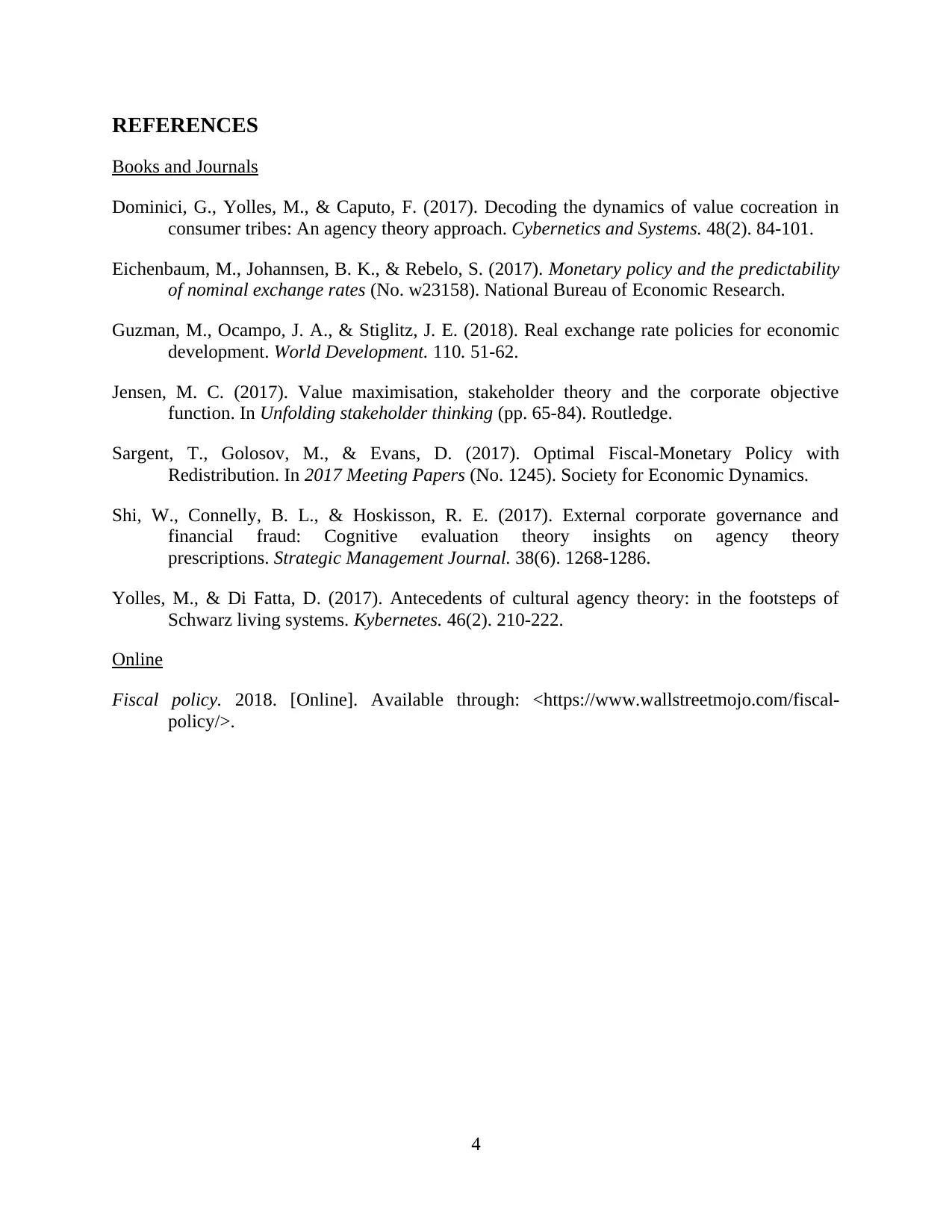
REFERENCES
Books and Journals
Dominici, G., Yolles, M., & Caputo, F. (2017). Decoding the dynamics of value cocreation in
consumer tribes: An agency theory approach. Cybernetics and Systems. 48(2). 84-101.
Eichenbaum, M., Johannsen, B. K., & Rebelo, S. (2017). Monetary policy and the predictability
of nominal exchange rates (No. w23158). National Bureau of Economic Research.
Guzman, M., Ocampo, J. A., & Stiglitz, J. E. (2018). Real exchange rate policies for economic
development. World Development. 110. 51-62.
Jensen, M. C. (2017). Value maximisation, stakeholder theory and the corporate objective
function. In Unfolding stakeholder thinking (pp. 65-84). Routledge.
Sargent, T., Golosov, M., & Evans, D. (2017). Optimal Fiscal-Monetary Policy with
Redistribution. In 2017 Meeting Papers (No. 1245). Society for Economic Dynamics.
Shi, W., Connelly, B. L., & Hoskisson, R. E. (2017). External corporate governance and
financial fraud: Cognitive evaluation theory insights on agency theory
prescriptions. Strategic Management Journal. 38(6). 1268-1286.
Yolles, M., & Di Fatta, D. (2017). Antecedents of cultural agency theory: in the footsteps of
Schwarz living systems. Kybernetes. 46(2). 210-222.
Online
Fiscal policy. 2018. [Online]. Available through: <https://www.wallstreetmojo.com/fiscal-
policy/>.
4
Books and Journals
Dominici, G., Yolles, M., & Caputo, F. (2017). Decoding the dynamics of value cocreation in
consumer tribes: An agency theory approach. Cybernetics and Systems. 48(2). 84-101.
Eichenbaum, M., Johannsen, B. K., & Rebelo, S. (2017). Monetary policy and the predictability
of nominal exchange rates (No. w23158). National Bureau of Economic Research.
Guzman, M., Ocampo, J. A., & Stiglitz, J. E. (2018). Real exchange rate policies for economic
development. World Development. 110. 51-62.
Jensen, M. C. (2017). Value maximisation, stakeholder theory and the corporate objective
function. In Unfolding stakeholder thinking (pp. 65-84). Routledge.
Sargent, T., Golosov, M., & Evans, D. (2017). Optimal Fiscal-Monetary Policy with
Redistribution. In 2017 Meeting Papers (No. 1245). Society for Economic Dynamics.
Shi, W., Connelly, B. L., & Hoskisson, R. E. (2017). External corporate governance and
financial fraud: Cognitive evaluation theory insights on agency theory
prescriptions. Strategic Management Journal. 38(6). 1268-1286.
Yolles, M., & Di Fatta, D. (2017). Antecedents of cultural agency theory: in the footsteps of
Schwarz living systems. Kybernetes. 46(2). 210-222.
Online
Fiscal policy. 2018. [Online]. Available through: <https://www.wallstreetmojo.com/fiscal-
policy/>.
4
⊘ This is a preview!⊘
Do you want full access?
Subscribe today to unlock all pages.

Trusted by 1+ million students worldwide
1 out of 6
Related Documents
Your All-in-One AI-Powered Toolkit for Academic Success.
+13062052269
info@desklib.com
Available 24*7 on WhatsApp / Email
![[object Object]](/_next/static/media/star-bottom.7253800d.svg)
Unlock your academic potential
Copyright © 2020–2026 A2Z Services. All Rights Reserved. Developed and managed by ZUCOL.





